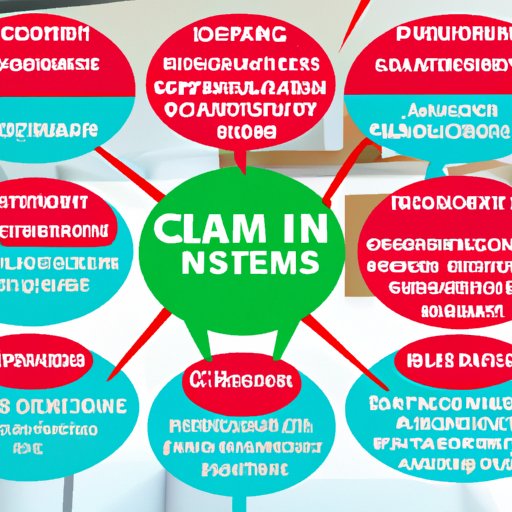Introduction
When it comes to persuasive writing, making a claim is one of the most important aspects. A claim is a statement that you make to support an argument or point of view. It is a way of convincing your audience that your opinion is valid and should be taken seriously. In order to make an effective claim, it is important to understand the different types of claims, their necessary elements, and how to craft an effective argument.

Different Types of Claims and Their Necessary Elements
There are several different types of claims that can be made. Each type of claim has its own set of necessary elements. The most common types of claims are fact, definition, value, cause, and policy claims.
Fact claims are statements that can be proven true or false. To make a fact claim, you must provide evidence to support your claim. For example, if you were to make a claim that the average temperature in July is 75 degrees Fahrenheit, you would need to provide data from reliable sources to support this claim.
Definition claims are statements that attempt to define a concept or term. These claims must be supported by evidence that explains what the term means. For example, if you were to make a claim that the term “justice” means fairness, you would need to provide evidence from reliable sources that explain the meaning of the term.
Value claims are statements that attempt to prove that something is good or bad. These claims must be supported by evidence that explains why the thing is either good or bad. For example, if you were to make a claim that a certain food is unhealthy, you would need to provide evidence from reliable sources that explain why the food is unhealthy.
Cause claims are statements that attempt to explain why something happened. These claims must be supported by evidence that explains why the thing happened. For example, if you were to make a claim that poverty is caused by a lack of education, you would need to provide evidence from reliable sources that explain why a lack of education leads to poverty.
Policy claims are statements that attempt to propose a solution to a problem. These claims must be supported by evidence that explains why the proposed solution is the best course of action. For example, if you were to make a claim that increasing taxes is the best way to reduce poverty, you would need to provide evidence from reliable sources that explain why increasing taxes is the best solution.

Examples of Commonly Used Claim Statements
It is also helpful to look at examples of commonly used claim statements. These examples can be used as a starting point when crafting your own claim. Some examples of specific claims include:
- The minimum wage should be increased.
- Climate change is a serious threat to the environment.
- Gun control laws should be stricter.
- The death penalty is an effective deterrent to crime.
- Healthcare should be available to all citizens.
These examples can be used to help you construct your own claim statements. When using these examples, it is important to make sure that you provide evidence to support your claim. This evidence can come from reliable sources such as scientific studies, government reports, or expert opinions.

Benefits of Making a Claim
Making a claim can have many benefits. One of the most important benefits is increased authority. By making a claim, you are asserting your opinion and giving yourself more credibility. This can help you to convince your audience that your argument is valid and should be taken seriously.
Making a claim can also improve your argumentative power. By making an informed and well-supported claim, you are giving your argument more weight and making it more convincing. This can help you to persuade your audience that your opinion is the correct one.
Finally, making a claim can enhance your credibility. If you make a well-supported claim, your audience will be more likely to trust you and take your argument seriously. This can help you to build trust with your audience and make them more receptive to your argument.
How to Craft an Effective Argument
Crafting an effective argument requires more than just making a claim. You must also establish relevant facts, develop a logical argument, and utilize evidence to support your claim. Establishing relevant facts involves gathering information about the topic you are discussing. This can include researching the issue, interviewing experts, and surveying relevant literature. Once you have gathered the necessary information, you can begin to develop a logical argument.
Developing a logical argument involves constructing a clear and concise argument that is easy to follow. This can include outlining the main points of your argument, providing evidence to support your claims, and refuting any opposing arguments. Finally, you must utilize evidence to support your claim. This evidence can come from reliable sources such as scientific studies, government reports, or expert opinions.
Tips on How to Research and Support Your Claim
Researching and supporting your claim is an essential part of making an effective argument. There are several sources of information that you can use to research and support your claim. These sources include books, journals, newspapers, websites, and interviews. Additionally, there are several strategies for gathering evidence. These strategies include conducting surveys, analyzing data, and conducting experiments.
Once you have gathered the necessary evidence, you must analyze it in order to determine how it supports your claim. This analysis can involve comparing different sources of evidence, evaluating the reliability of each source, and determining how the evidence can be used to support your argument. By utilizing these techniques, you can ensure that your claim is well-supported and your argument is effective.
Conclusion
In conclusion, making a claim is an important part of persuasive writing. It is important to understand the different types of claims and their necessary elements, as well as examples of commonly used claim statements. Additionally, it is important to understand the benefits of making a claim, tips on crafting an effective argument, and strategies for researching and supporting your claim.
By following these tips, you can ensure that your claim is well-supported and your argument is effective. With practice and dedication, you can become an expert at making claims and crafting persuasive arguments.
(Note: Is this article not meeting your expectations? Do you have knowledge or insights to share? Unlock new opportunities and expand your reach by joining our authors team. Click Registration to join us and share your expertise with our readers.)
